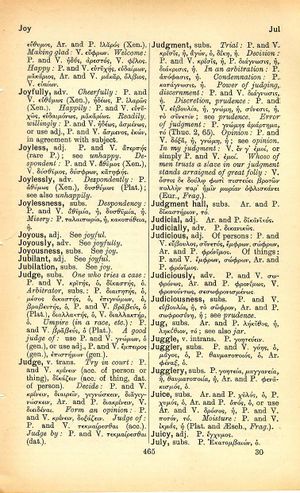judge: Difference between revisions
Ἒστιν ὃ μὲν χείρων, ὃ δ' ἀμείνων ἔργον ἕκαστον· οὐδεὶς δ' ἀνθρώπων αὐτὸς ἅπαντα σοφός. (Theognis 901f.) → One is worse, the other better at each deed, but no man is wise in all things.
(CSV4) |
m (Woodhouse1 replacement) |
||
| Line 1: | Line 1: | ||
{{Woodhouse1 | {{Woodhouse1 | ||
|Text=[[File:woodhouse_465.jpg|thumb|link={{filepath:woodhouse_465.jpg}}]] | |Text=[[File:woodhouse_465.jpg|thumb|link={{filepath:woodhouse_465.jpg}}]] | ||
===substantive=== | |||
[[one who tries a case]]: [[prose|P.]] and [[verse|V.]] [[κριτής]], ὁ, [[δικαστής]], ὁ. | |||
[[arbitrator]], subs.: [[prose|P.]] [[διαιτητής]], ὁ, [[μέσος δικαστής]], ὁ, [[ἐπιγνώμων]], ὁ, [[βραβευτής]], ὁ, [[prose|P.]] and [[verse|V.]] [[βραβεύς]], ὁ ([[Plato]]), [[διαλλακτής]], ὁ, [[verse|V.]] [[διαλλακτήρ]], ὁ. | |||
[[umpire]] ([[in a race]], etc.): [[prose|P.]] and [[verse|V.]] [[βραβεύς]], ὁ ([[Plato]]). | |||
[[a good judge of]]: use [[prose|P.]] and [[verse|V.]] [[γνώμων]], ὁ (gen.), or use adj., [[prose|P.]] and [[verse|V.]] [[ἔμπειρος]] (gen.), [[ἐπιστήμων]] (gen.). | |||
===verb transitive=== | |||
[[try in court]]: [[prose|P.]] and [[verse|V.]] [[κρίνειν]] (acc. of person or thing), [[δικάζειν]] (acc. of thing, dat. of person). | |||
[[decide]]: [[prose|P.]] and [[verse|V.]] [[κρίνειν]], [[διαιρεῖν]], [[γιγνώσκειν]], [[διαγιγνώσκειν]], [[Aristophanes|Ar.]] and [[prose|P.]] [[διακρίνειν]], [[verse|V.]] [[διειδέναι]]. | |||
[[form an opinion]]: [[prose|P.]] and [[verse|V.]] [[κρίνειν]], [[δοξάζειν]]. | |||
[[judge of]]: [[prose|P.]] and [[verse|V.]] [[τεκμαίρεσθαι]] (acc.). | |||
[[judge by]]: [[prose|P.]] and [[verse|V.]] [[τεκμαίρεσθαι]] (dat.). | |||
}} | }} | ||
Revision as of 08:50, 20 May 2020
English > Greek (Woodhouse)
substantive
one who tries a case: P. and V. κριτής, ὁ, δικαστής, ὁ.
arbitrator, subs.: P. διαιτητής, ὁ, μέσος δικαστής, ὁ, ἐπιγνώμων, ὁ, βραβευτής, ὁ, P. and V. βραβεύς, ὁ (Plato), διαλλακτής, ὁ, V. διαλλακτήρ, ὁ.
umpire (in a race, etc.): P. and V. βραβεύς, ὁ (Plato).
a good judge of: use P. and V. γνώμων, ὁ (gen.), or use adj., P. and V. ἔμπειρος (gen.), ἐπιστήμων (gen.).
verb transitive
try in court: P. and V. κρίνειν (acc. of person or thing), δικάζειν (acc. of thing, dat. of person).
decide: P. and V. κρίνειν, διαιρεῖν, γιγνώσκειν, διαγιγνώσκειν, Ar. and P. διακρίνειν, V. διειδέναι.
form an opinion: P. and V. κρίνειν, δοξάζειν.
judge of: P. and V. τεκμαίρεσθαι (acc.).
judge by: P. and V. τεκμαίρεσθαι (dat.).

